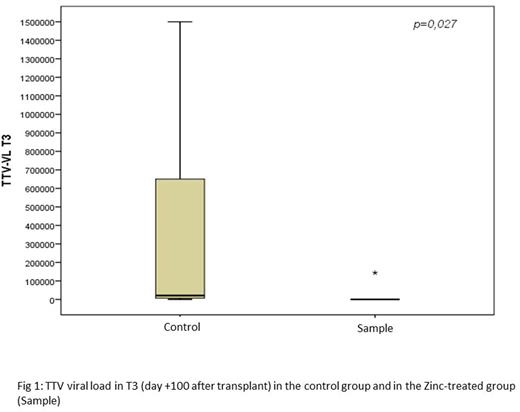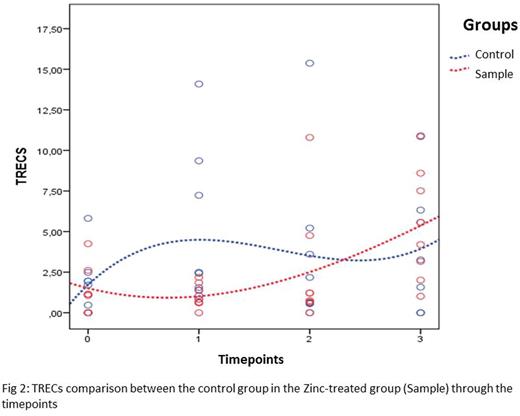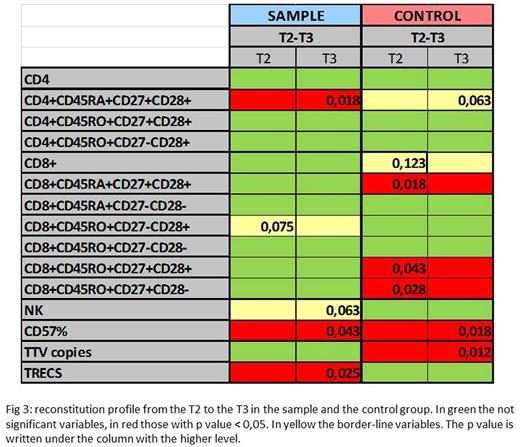Abstract
Introduction: Immune reconstitution after stem cell transplantation (SCT) plays a crucial role in host defense against microbial agents. The thymus atrophy occurring with ageing represents a limit for de novo T-cell reconstitution, although the reactivation of thymic function after BMT is documented. The proper strategy to improve the thymic output is currently matter of debate. Pre-clinical and clinical evidences suggest that Zinc oral supplementation may contribute to thymic reactivation and to improve the T-mediated cellular defense against pathogens. We tested the role of Zinc oral supplementation in immune reconstitution, using as model the autologous SCT in multiple myeloma.
Methods: From January 2014 to May 2016, we prospectively enrolled 18 patients (12 male, 6 female; average age: 58 years, range 43-72) undergoing single MEL 100 or 200 auto-SCT after one or two lines of therapy (VTD, lyposomal anthracycline and lenalidomide) and stem cell collection (mobilizing therapy: cyclophosphamide 3 g/sqm and G-CSF). The trial, prospective and randomized, has been approved by local ethics committee (EUDRACT: 2014-004499-47). All patients undersigned the informed consent. The clinical trial was carried out in accordance with Helsinki declaration. Randomization was effected at day 0 (day of PBSC infusion).
Results: nine patients were treated from day +5 to day +100 after transplant with 600 mg/day of Zinc sulfate (uncoated tablets), whereas nine patients received only standard antimicrobial prophylaxis. Peripheral blood samples were collected in both groups at day +30 (t2) and day +100 (t3). Eight-colour flow cytometry was performed for CD3, CD4, CD8, CD45RA, CD45R0, CD27, CD28, CD25, CD127, with specific gates to identify specific lymphocyte populations (T naïve, T central memory, T effector memory, T terminal memory). The lymphocyte's population's count was statistically analysed intra- and inter-group with Wilcoxon test. Droplet-digital PCR for TRECs was performed on lymphocytes isolated by peripheral blood. A qPCR for viral load of Torquetenovirus (TTV), a harmless virus whose viral load is related to immunodepression, was performed. Zinc serum level was measured.
Results: The only significant difference in the clinical features between the 2 groups was the mean age (58 years in the control group, 63 years in the sample). The recovery of naïve CD4 cells was visible in both groups from day +30 to day +100, but a significant increase was detected only in the Zinc group. Similarly, TRECs showed a significant increase in the treated group. CD8+ T cells showed a notable decrease until day 100 in the control group, specifically the CD8 naïve, memory, and effector memory populations. TTV load in the control group increased in inverse proportion to the decrease of CD8 population. In the Zinc group there were no differences between the TTV loads at the two time points. As a result, the viral load of TTV was higher in the control group than in the Zinc group at day +100. Zinc serum levels were normal in all patients.
Conclusions: data show that Zinc plays a role in a faster recovery of TRECs and CD4 naïve T cells after autologous transplantation. Furthermore, Zinc seems to prevent the expected CD8 decrease of the control group, thus probably explaining the TTV reactivation. Zinc-deficiency was not observed in any of the patient; however, a Zinc supplementation may contribute to a better T-cell reconstitution. To the best of our knowledge, this is the first study describing the role of Zinc after stem cell transplantation.
No relevant conflicts of interest to declare.
Author notes
Asterisk with author names denotes non-ASH members.




This feature is available to Subscribers Only
Sign In or Create an Account Close Modal